Βι¶ΉΤΌΕΔ Radio Lincolnshire: Reunited - A journey of Remembrance
Michael Hortin
Βι¶ΉΤΌΕΔ Radio Lincolnshire
Tagged with:
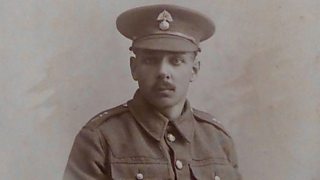
Charles Beechey – Killed fighting in East Africa.
The Beechey family suffered unbearable loss in the First World War with five of their eight sons being killed. One hundred years on from the death of the fifth Beechey brother, Βι¶ΉΤΌΕΔ Radio Lincolnshire's Michael Hortin follows in their footsteps telling their story and reuniting them with an act of Remembrance.
Even amongst the carnage of the First World War the story of the Beecheys stands out. At the outbreak of WWI the family was a large one with eight sons and five daughters. All the brothers saw service, with five killed and a sixth left with life-changing injuries. The family was one of three in England to suffer such loss.
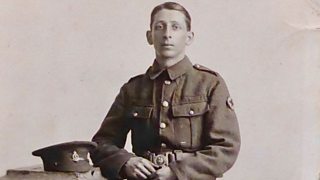
Eric Beechey – Survived the war after serving in Malta and Greece.
What marked the Beecheys out for our project, in addition to being from our area, was the archive of letters from the brothers that survives. Reading them you get a real feel for their differing personalities, they become much more than a name on a headstone.
Telling their story we had three aims: to produce as much of the content as possible using a smartphone; to reunite the brothers in some way, 100 years on and to follow in their footsteps to tell their story.
Save for some photos and an interview the first has already been achieved, with the help of a tripod, lapel mic and iphone stand.
The second objective was initially the hardest to pin down. However the answer was on our doorstep, and in the families’ strong Christian faith. I approached Lincoln Cathedral for support, the result was six crosses carved from the stone it is built from. These were to be laid at the graves of those killed in WWI, bringing them together with an act of Remembrance. A sixth was to be put on display at the church where the brothers’ father was once vicar. In addition to the religious significance, it is worth explaining the importance of the Cathedral to people in Lincoln, like the brothers. You only truly know you are home when you see it. As a result we felt that by taking crosses to the brothers, we were also bringing their home county to them.
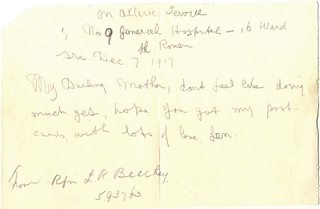
Final letter from Leonard to his mum, was sent three weeks before he died of Tetanus. (Credit: Lincolnshire County Council)
After 10 weeks planning, in September and October I began a four-week journey through six countries in the brothers’ footsteps. The first week was spent in France and Belgium where the majority of the brothers’ saw action. The next in Greece and then Gallipoli, where two brothers served as Anzacs. The third week was in Tanzania where the second eldest brother Charles was killed and is now buried. The final few days were in Australia following the story of the Anzac brothers before and after the war.
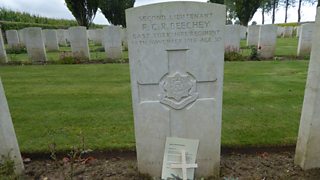
The headstone of Frank Beechey.
By the end of the journey four of the crosses had been left at Commonwealth War Grave Cemeteries. After a short period there, the CWGC are going to remove them to them be put on permanent display at their centres. The fifth for one of the Anzac brothers, who has no known grave, is being put on permanent display from the 11 November at the military chapel in Perth, Western Australia.
The final cross will be put on permanent display at the family church, where the brothers’ father preached until his death in 1912. At that moment I will have a feeling that in some ways the brothers have been bought a little closer.
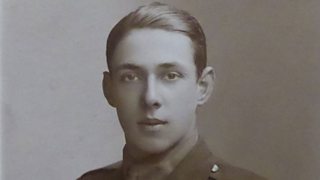
Sam Beechey – Youngest son, served for last few months of the war.
From this journey we will produce a series and documentary for radio for both Remembrance Week and Christmas, short films about each brother and a vlog of the journey and supporting article.
It goes without saying all the above would not have been possible without the support of many people and organisations inside and outside the Βι¶ΉΤΌΕΔ and across the countries visited.
When I reflect on the family’s story my mind always returns to the mother Amy, who must have opened letters from her sons with a mixture of hope and fear. Sadly her voice, save for one letter, is largely silent. However in April 1918 we get a window to her world as she met King George and Queen Mary. When Queen Mary expressed sympathy for the families sacrifice she replied “It was no sacrifice Ma’am, I did not give them willingly”.
Michael Hortin is a producer for Βι¶ΉΤΌΕΔ Radio Lincolnshire
